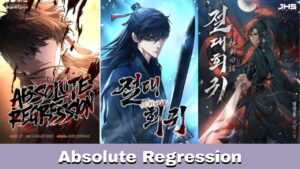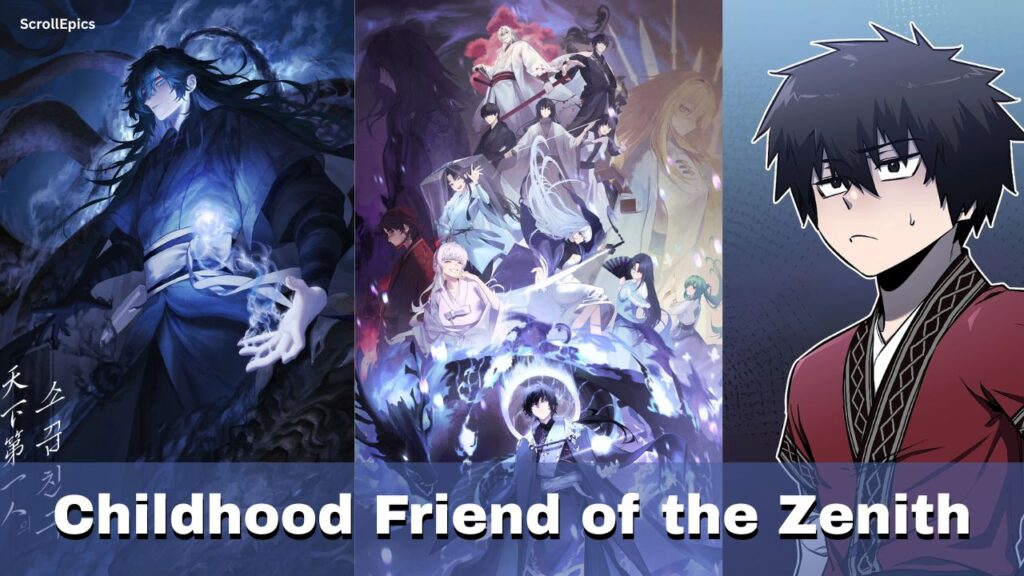
If you’re someone who’s grown tired of typical murim or wuxia regression stories — the kind with overpowered protagonists collecting hidden treasures like they’re grocery shopping — then Absolute Regression (절대회귀) is a breath of fresh, grounded air. It’s not just a story about going back in time for revenge. It’s a quiet, powerful exploration of regret, reconciliation, and how one man tries to rebuild the life he lost.
This review dives into what makes Absolute Regression stand out among its genre peers, why so many readers are emotionally invested, and what you can expect in terms of pacing, tone, and character development.
Where to Read Absolute Regression
The Korean web novel is available on Naver Series.
For non-Korean readers, you’ll need to rely on fan translations, usually found on community-hosted novel forums like novelupdates or translation aggregators.
What Absolute Regression Is About
The novel opens with a single line that sets the tone for everything that follows:
“Send me to the past.”
Unlike many regression novels where the protagonist jumps back and effortlessly manipulates the world with future knowledge, Absolute Regression is different. Yes, the main character benefits from experience — but that’s not the focus.
Here, regression is about regret.
The MC’s return to the past is not to accumulate power or collect artifacts, but to mend relationships and fix what went wrong. His mission is personal, emotional. Each arc adds to the central theme of healing—whether it’s reconciling with his father, rebuilding bonds with his brother, or just sharing a drink with an old companion in a quiet tavern.
That doesn’t mean the story lacks action — it’s still a martial world, filled with mystery, powerful enemies, and hidden threats. But the fights are not what define the novel. The emotional weight does.
One of the best things about this novel is how it treats the regression setup with maturity. The MC doesn’t get by on luck or cheat codes. Sure, he uses his knowledge to avoid past mistakes, but nothing comes easily. Strength has to be earned. And often, the real battles aren’t fought with fists, but with words and vulnerability.
Even the power system reflects that realism. There’s no flashy realm-breaking or color-coded ranks. Martial techniques are rated by “stars,” which measure skill, not raw power. That can make it a bit tricky to gauge how strong someone is without an actual fight, but it fits the story’s tone — it’s not about comparing levels, it’s about seeing growth through action and choice.
A Refreshing Take on the Regression Genre
Regression novels tend to fall into predictable rhythms: overpower early, humiliate enemies, rinse and repeat. Absolute Regression breaks that cycle by taking its time with character interactions and worldbuilding.
According to multiple readers, one of the best aspects of this novel is that the characters actually change. They grow. They aren’t just one-dimensional background pieces for the protagonist to outshine.
You won’t find cookie-cutter antagonists yelling “Courting death!” or mindless sidekicks nodding in awe every time the MC speaks. Every arc builds on the last, and events from the past carry weight — shaping what’s to come in subtle, often unexpected ways.
That sense of continuity and cause-effect storytelling is rare in this genre and makes the novel feel far more immersive and lived-in.
Absolute Regression Characters Guide
What makes Absolute Regression stand out isn’t the premise or the setting — it’s the people. Every major character feels alive. They don’t exist to boost the MC’s ego or fill in background roles. They matter. They evolve. And many of them steal the spotlight in the best possible way.
Geom Mugeuk – The Protagonist
Our MC Mugeuk is someone who’s lived through 70 years of mistakes, and he carries that weight. He’s calm, thoughtful, and sometimes too confident for his own good. There are moments where his internal monologue borders on arrogance, but even then, it’s rooted in pain. He’s not trying to show off — he’s trying to survive, to change, and to protect what he once lost.
He doesn’t just push people away to become stronger. In fact, he spends a lot of time reconnecting — sitting in taverns, sharing drinks, listening more than talking. Those quiet moments are what define him. That’s where the real progress happens.
Geom Woojin – MC’s Father
One of the most emotionally layered relationships in the novel is between the MC and his father — a powerful man who leads the demonic cult but lives a hollow life. He has authority, but no freedom. Power, but no warmth. You can feel the tragedy in every scene they share.
Their dynamic is slow to rebuild, but beautifully written. It’s never forced. It’s awkward, painful, and incredibly human. Watching them try to understand each other again — after everything that’s happened — is one of the story’s most powerful arcs.
Geom Muyang – MC’s Older Brother
According to his younger brother, Geom Mugeuk, he is a cunning and ambitious man with a streak of malice. Despite his flaws, he constantly sought their father’s approval, often boasting for years about even the smallest compliments or words of praise he received.
He is deeply distrustful, even toward his closest ally, the Demonic Buddha, who remains loyal to him. Geom Mugeuk revealed that he fed him exaggerated or false stories about the dangers of the murim world to dampen Mugeuk’s motivation to train in martial arts and heighten his fear of the outside world—ultimately to secure his own position as their father’s successor.
Lee Ahn
Lee Ahn might catch you off guard. At first glance, you might expect her to be a typical side character romance — someone to give the MC motivation or emotional baggage. But she’s so much more.
She’s bright, layered, and has her own presence in the story. Every scene with her brings warmth and depth. Her relationship with the MC grows naturally, and while the romance isn’t the main focus, it’s sincere and meaningful. Even readers who don’t usually enjoy romance in martial arts novels find themselves rooting for her.
Side Characters and the Supreme Demons
This is where the novel really pulls ahead of the competition. There are no filler characters here. Everyone — from a random tavern guest to a feared Supreme Demon — has purpose and personality.
They’re not stereotypes. They don’t just exist to prop up the protagonist. In fact, many of them influence the plot in major ways. Some challenge the MC. Others support him. But all of them feel real.
There’s a sense of interconnectedness in the world that few novels pull off. Every arc feeds into the next. Actions have consequences. And people remember — which is more than can be said for most stories in this genre.
What This Novel Does Right – Its Real Strengths
Character-Driven Storytelling
At its heart, Absolute Regression is not a power fantasy — it’s a character drama. Every interaction feels purposeful. Relationships evolve over time, and no one is stuck in a rigid role. Whether it’s the MC’s father slowly softening over the course of several arcs or a one-time antagonist revealing unexpected depth, this novel understands people — their pain, pride, and quiet hopes.
It’s a story where the emotional payoff often hits harder than any duel.
A Refreshing Lack of Clichés
This is one of the few regression novels where you won’t hear the words “You dare?” or “Courting death!” screamed every other chapter. There are no arrogant young masters to slap around, no endless stream of repetitive sect elders. Conflicts aren’t manufactured — they come from believable tensions and personal stakes.
It’s the kind of writing that respects the reader’s intelligence.
Tight Worldbuilding with Real Continuity
Every arc feels like a continuation of the one before. The events that happen — even small ones — echo in future chapters. If a character gets introduced in a tavern, chances are they’ll come back later with more relevance. The world doesn’t reset after every fight or power-up. It grows.
You can tell the author has a long-term vision and is in full control of where this story is going.
Realistic Pacing and Quiet Moments
Not every chapter is a battle. Often, the MC is simply talking, drinking, or reflecting. But those chapters never feel like filler. They’re filled with emotional tension, subtle growth, and character-building moments. It’s a much-needed break from the usual “battle every 3 chapters” structure of most murim novels.
Where It Falls Short – Honest Weaknesses
Power Scaling Is Vague
There’s no clear cultivation system — no tiers or levels that let you quickly compare strength. While techniques are ranked by “stars,” that only tells you how skilled someone is at a style, not how much stronger they are overall.
It doesn’t ruin the story, but it can make some fights confusing. You often don’t know how outmatched someone is until the duel is already happening.
Occasional Plot Convenience
There are moments where the MC seems to stumble into exactly what he needs — a growth pill here, a chance encounter there. While not overwhelming, it happens often enough to feel like a crutch. Some power-ups feel less earned and more like narrative shortcuts.
The MC’s Confidence Becomes Arrogance
While the protagonist starts out humble and emotionally grounded, his inner monologues can sometimes cross the line into self-congratulatory territory. Not everyone will mind — but if you’re sensitive to tone shifts, it can be a turnoff. One reader even considered dropping the novel just because of this.
Absolute Regression FAQ
Is this a typical regression novel?
No. It’s deeper, slower, and more emotionally driven. The regression is a narrative tool, not a cheat code.
Is the action satisfying?
Mostly, yes. While the power scaling can be vague, the fights feel meaningful — often because of what they represent emotionally. If you want flashy martial arts duels every chapter, this might feel slow. But if you want stakes and story behind each battle, it delivers.
Does the story get better over time?
Absolutely. The beginning is slow, but things build steadily. Characters become more complex. Conflicts grow deeper. If you stick with it, the payoff is real.
Are there cheap tropes like “arrogant young masters” or revenge-only plots?
No. That’s one of the novel’s biggest strengths — it avoids the clichés that weigh down so many murim stories.
Final Verdict
Absolute Regression isn’t perfect — but it’s easily one of the most emotionally mature, character-focused regression stories out there. It strips away the genre’s usual noise and gives us something honest, layered, and resonant.
It’s about family. About confronting past mistakes. About being vulnerable and learning to connect. Even when the pacing slows or the MC becomes a bit much, the heart of the story keeps you reading.
Whether it’s a quiet conversation between father and son or a shared drink with an old rival, this novel knows how to hit you where it counts.
If you’re tired of shallow power progression and want a martial arts novel that respects your emotional intelligence — Absolute Regression is the one.

